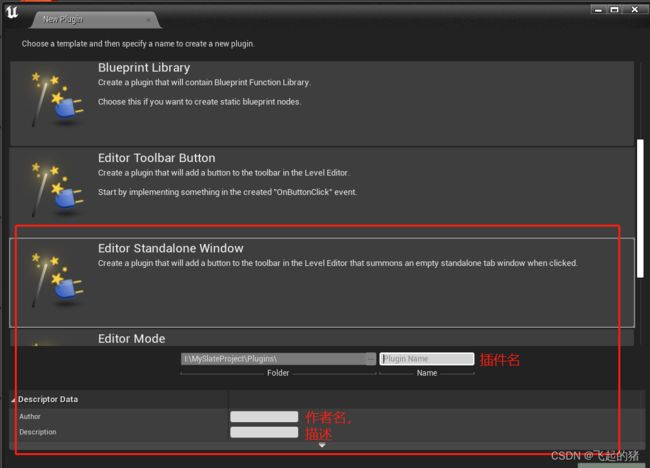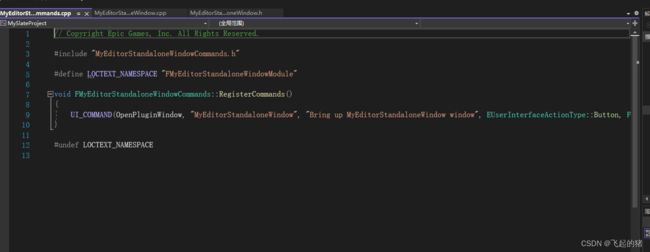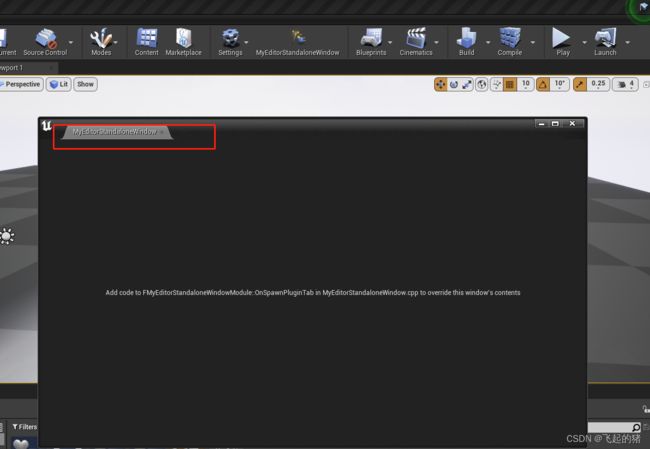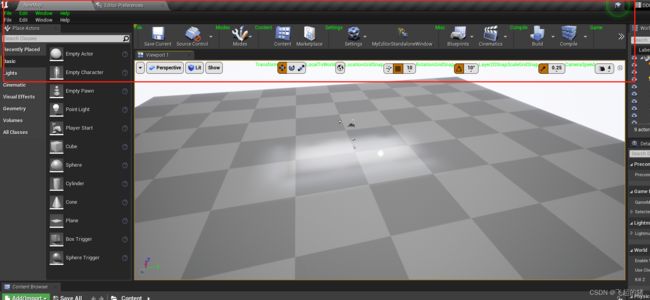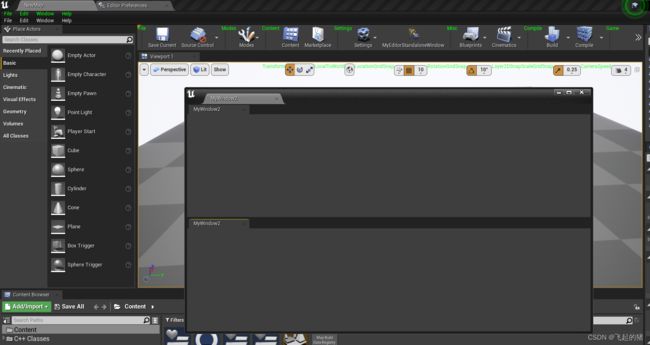【虚幻引擎】UE4/UE5插件
一、插件分类
插件分为七大类
- Blank:空白插件,可以从头开始自己定义想要的插件风格和内容,用此模板创建的插件不会有注册或者菜单输入。
- BlueprintLibrary:创建一个含有蓝图函数库的插件,此模板函数都是静态全局函数,可以在蓝图中直接调用。
- ContentOnly:创建一个只包含内容的空白文件
- Editor Toolbar Button:创建关卡编辑器的工具栏中的按钮插件,首先在创建的点击事件中实现一些内容
- Editor Standalone Window:创建关卡编辑器的工具栏中的按钮插件,点击按钮可调出一个空白选项独立卡窗口
- Editor Mode:创建一个含有编辑器模式的插件
- Third Party Library:创建一个已包含第三方库的插件
二、插件模块
插件可含有任意数量的模块源目录。多数插件仅有一个模块(但可创建多个模块,例如插件包含纯编辑器功能时),及游戏期间要运行的其他代码。
插件源文件的大部分布局与引擎中其他C++模块相同。
在模块的 Source 目录(或其子目录)内,插件可在标头文件中声明新反映的类型(UCLASS、USTRUCT 等)。引擎的构建系统将检测此类文件,并按需要生成代码支持新类型。需遵守C++模块中使用 Uobjects 时的一般规则,例如在模块的源文件中包含生成的标头文件和模块 generated.inl 文件。
UE4支持共生模块和插件。通过在自身.uproject文件中启用插件,项目模块可依赖插件。类似地,通过在自身.uplugin文件中启用其他插件,插件可表明依赖性。但其中有一项重要限制:插件和模块将拆分为若干层级,仅能依赖同一级或更高级的其他插件或模块。例如,项目模块可依赖引擎模块,但引擎模块无法依赖项目模块。这是因为引擎(及其所有插件和模块)的级别高于项目,须能在无项目的情况下编译。
三、引擎插件和项目插件
虚幻引擎4的 Engine 目录下包含部分内置插件。引擎插件和项目插件类似,但可用于所有项目。此类插件通常由引擎和工具程序员创建,目的在于提供可在多个项目中使用并能在单一位置维护的基线功能。利用此功能,用户可直接添加或覆盖引擎功能,而无需修改引擎代码。
项目插件位于项目目录的 Plugins 子文件夹下,将在引擎或编辑器启动时被探测和加载。如插件包含具有 Source 文件夹(和 .Build.cs 文件)的模块,插件代码将被自动添加到生成的C++项目文件,以便在开发项目时开发插件。编译项目时,有可用源的插件都被作为游戏依赖项进行编译。项目生成器将忽略无 Source 文件夹的插件,其不会出现在C++项目文件中,但若存在二进制文件,启动时仍将加载此类插件。
插件的描述,描述的文件是Json格式,以官方案例为准
{
"FileVersion" :3,
"Version" :1,
"VersionName" :"1.0",
"FriendlyName" :"UObject Example Plugin",
"Description" :"An example of a plugin which declares its own UObject type.This can be used as a starting point when creating your own plugin.",
"Category" :"Examples",
"CreatedBy" :"Epic Games, Inc.",
"CreatedByURL" :"http://epicgames.com",
"DocsURL" :"",
"MarketplaceURL" :"",
"SupportURL" :"",
"EnabledByDefault" : true,
"CanContainContent" : false,
"IsBetaVersion" : false,
"Installed" : false,
"Modules" :
[
{
"Name" :"UObjectPlugin",
"Type" :"Developer",
"LoadingPhase" :"Default"
}
]
}四、案例分析Editor Standalone Window
创建一个Editor Standalone Window插件,命名为:MyEditorStandaloneWindow
创建成功之后VS会出现Plugins
MyEditorStandaloneWindow:主函数所有的主要逻辑都是写在这里,包含了注册命令,布局分布,按钮点击事件等。
MyEditorStandaloneWindowCommand:声明一些命令变量,注册函数等。
MyEditorStandaloneWindowStyle:插件的样式风格。
创建好之后我们会在编辑器工具栏中看到我们的插件
点击这个按钮触发的事件通过MapAction创建代理函数绑定,执行
创建独立窗口
void FMyEditorStandaloneWindowModule::PluginButtonClicked()
{
FGlobalTabmanager::Get()->TryInvokeTab(MyEditorStandaloneWindowTabName);
}内容的注册通过FGlobalTabmanager::Get()->RegisterNomadTabSpawner
FGlobalTabmanager::Get()->RegisterNomadTabSpawner(MyEditorStandaloneWindowTabName, FOnSpawnTab::CreateRaw(this, &FMyEditorStandaloneWindowModule::OnSpawnPluginTab))
.SetDisplayName(LOCTEXT("FMyEditorStandaloneWindowTabTitle", "MyEditorStandaloneWindow"))
.SetMenuType(ETabSpawnerMenuType::Hidden);他本质上就是一个SDockTab,返回的是一个TSharedRef
TSharedRef FMyEditorStandaloneWindowModule::OnSpawnPluginTab(const FSpawnTabArgs& SpawnTabArgs)
{
FText WidgetText = FText::Format(
LOCTEXT("WindowWidgetText", "Add code to {0} in {1} to override this window's contents"),
FText::FromString(TEXT("FMyEditorStandaloneWindowModule::OnSpawnPluginTab")),
FText::FromString(TEXT("MyEditorStandaloneWindow.cpp"))
);
return SNew(SDockTab)
.TabRole(ETabRole::NomadTab)
[
// Put your tab content here!
SNew(SBox)
.HAlign(HAlign_Center)
.VAlign(VAlign_Center)
[
SNew(STextBlock)
.Text(WidgetText)
]
];
} 五、自定义插件内容
首先打开UI扩展点
这些绿色的扩展点主要是用于菜单按钮和工具按钮的排序的,添加一个绿色的扩展点统管N个菜单按钮,如果你可以自定义自己的UI扩展点,并将自己的扩展点下的菜单按钮安插在某个扩展点之后。也就是UI扩展点是用于布局菜单栏和工具栏的顺序的。
第一步:首先加载模块
//首先加载模块FExtend最后都在FLevelEditorModule中管理
FLevelEditorModule& LevelEditorModule = FModuleManager::LoadModuleChecked("LevelEditor"); 第二步:创建对象
{
TSharedPtr MenuExtender = MakeShareable(new FExtender());
MenuExtender->AddMenuExtension("WindowLayout", EExtensionHook::After, PluginCommands, FMenuExtensionDelegate::CreateRaw(this, &FMyEditorStandaloneWindowModule::AddMenuExtension));
LevelEditorModule.GetMenuExtensibilityManager()->AddExtender(MenuExtender);
}
{
TSharedPtr ToolbarExtender = MakeShareable(new FExtender);
ToolbarExtender->AddToolBarExtension("Settings", EExtensionHook::After, PluginCommands, FToolBarExtensionDelegate::CreateRaw(this, &FMyEditorStandaloneWindowModule::AddToolbarExtension));
LevelEditorModule.GetToolBarExtensibilityManager()->AddExtender(ToolbarExtender);
} 第三步:注册绑定对象事件
FGlobalTabmanager::Get()->RegisterNomadTabSpawner(MyEditorStandaloneWindowTabName, FOnSpawnTab::CreateRaw(this, &FMyEditorStandaloneWindowModule::OnSpawnPluginTab))
.SetDisplayName(LOCTEXT("FMyEditorStandaloneWindowTabTitle", "MyTestWindow"))
.SetMenuType(ETabSpawnerMenuType::Hidden);
FGlobalTabmanager::Get()->RegisterNomadTabSpawner("MyWindow1", FOnSpawnTab::CreateRaw(this, &FMyEditorStandaloneWindowModule::SpawnCustomTab))
.SetDisplayName(LOCTEXT("FMyEditorStandaloneWindowTabTitle", "MyWindow1"))
.SetMenuType(ETabSpawnerMenuType::Hidden);
FGlobalTabmanager::Get()->RegisterNomadTabSpawner("MyWindow2", FOnSpawnTab::CreateRaw(this, &FMyEditorStandaloneWindowModule::SpawnCustomTab))
.SetDisplayName(LOCTEXT("FMyEditorStandaloneWindowTabTitle", "MyWindow2"))
.SetMenuType(ETabSpawnerMenuType::Hidden);第四步:FTabManager重新布局
const TSharedRef NomadTab = SNew(SDockTab)
.TabRole(ETabRole::NomadTab);
if (!MyWindowTabManager.IsValid())
{
MyWindowTabManager = FGlobalTabmanager::Get()->NewTabManager(NomadTab);
}
if (!MyWindowLayout.IsValid())
{
MyWindowLayout = FTabManager::NewLayout("TestLayoutWindow")
->AddArea
(
FTabManager::NewPrimaryArea()
->SetOrientation(Orient_Vertical)
->Split
(
FTabManager::NewStack()
->SetSizeCoefficient(.5f)
->AddTab("MyWindow1", ETabState::OpenedTab)
)
->Split
(
FTabManager::NewStack()
->SetSizeCoefficient(.5f)
->AddTab("MyWindow2", ETabState::OpenedTab)
)
);
}
TSharedRef TabContents = MyWindowTabManager->RestoreFrom(MyWindowLayout.ToSharedRef(), TSharedPtr()).ToSharedRef();
NomadTab->SetContent(TabContents); 效果如下:
完整代码附上:
MyEditorStandaloneWindow.h文件
// Copyright Epic Games, Inc. All Rights Reserved.
#pragma once
#include "CoreMinimal.h"
#include "Modules/ModuleManager.h"
class FToolBarBuilder;
class FMenuBuilder;
class FMyEditorStandaloneWindowModule : public IModuleInterface
{
public:
/** IModuleInterface implementation */
virtual void StartupModule() override;
virtual void ShutdownModule() override;
/** This function will be bound to Command (by default it will bring up plugin window) */
void PluginButtonClicked();
private:
void RegisterMenus();
TSharedRef OnSpawnPluginTab(const class FSpawnTabArgs& SpawnTabArgs);
private:
TSharedPtr PluginCommands;
void AddMenuExtension(FMenuBuilder& Builder);
void AddToolbarExtension(FToolBarBuilder& Builder);
TSharedRef SpawnCustomTab(const FSpawnTabArgs& Arg);
TSharedPtr MyWindowTabManager;
TSharedPtr MyWindowLayout;
};
MyEditorStandaloneWindow.cpp文件
// Copyright Epic Games, Inc. All Rights Reserved.
#include "MyEditorStandaloneWindow.h"
#include "MyEditorStandaloneWindowStyle.h"
#include "MyEditorStandaloneWindowCommands.h"
#include "LevelEditor.h"
#include "Widgets/Docking/SDockTab.h"
#include "Widgets/Layout/SBox.h"
#include "Widgets/Text/STextBlock.h"
#include "ToolMenus.h"
static const FName MyEditorStandaloneWindowTabName("MyEditorStandaloneWindow");
#define LOCTEXT_NAMESPACE "FMyEditorStandaloneWindowModule"
void FMyEditorStandaloneWindowModule::StartupModule()
{
// This code will execute after your module is loaded into memory; the exact timing is specified in the .uplugin file per-module
FMyEditorStandaloneWindowStyle::Initialize();
FMyEditorStandaloneWindowStyle::ReloadTextures();
FMyEditorStandaloneWindowCommands::Register();
PluginCommands = MakeShareable(new FUICommandList);
PluginCommands->MapAction(
FMyEditorStandaloneWindowCommands::Get().OpenPluginWindow,
FExecuteAction::CreateRaw(this, &FMyEditorStandaloneWindowModule::PluginButtonClicked),
FCanExecuteAction());
//UToolMenus::RegisterStartupCallback(FSimpleMulticastDelegate::FDelegate::CreateRaw(this, &FMyEditorStandaloneWindowModule::RegisterMenus));
//首先加载模块FExtend最后都在FLevelEditorModule中管理
FLevelEditorModule& LevelEditorModule = FModuleManager::LoadModuleChecked("LevelEditor");
{
TSharedPtr MenuExtender = MakeShareable(new FExtender());
MenuExtender->AddMenuExtension("WindowLayout", EExtensionHook::After, PluginCommands, FMenuExtensionDelegate::CreateRaw(this, &FMyEditorStandaloneWindowModule::AddMenuExtension));
LevelEditorModule.GetMenuExtensibilityManager()->AddExtender(MenuExtender);
}
{
TSharedPtr ToolbarExtender = MakeShareable(new FExtender);
ToolbarExtender->AddToolBarExtension("Settings", EExtensionHook::After, PluginCommands, FToolBarExtensionDelegate::CreateRaw(this, &FMyEditorStandaloneWindowModule::AddToolbarExtension));
LevelEditorModule.GetToolBarExtensibilityManager()->AddExtender(ToolbarExtender);
}
FGlobalTabmanager::Get()->RegisterNomadTabSpawner(MyEditorStandaloneWindowTabName, FOnSpawnTab::CreateRaw(this, &FMyEditorStandaloneWindowModule::OnSpawnPluginTab))
.SetDisplayName(LOCTEXT("FMyEditorStandaloneWindowTabTitle", "MyTestWindow"))
.SetMenuType(ETabSpawnerMenuType::Hidden);
FGlobalTabmanager::Get()->RegisterNomadTabSpawner("MyWindow1", FOnSpawnTab::CreateRaw(this, &FMyEditorStandaloneWindowModule::SpawnCustomTab))
.SetDisplayName(LOCTEXT("FMyEditorStandaloneWindowTabTitle", "MyWindow1"))
.SetMenuType(ETabSpawnerMenuType::Hidden);
FGlobalTabmanager::Get()->RegisterNomadTabSpawner("MyWindow2", FOnSpawnTab::CreateRaw(this, &FMyEditorStandaloneWindowModule::SpawnCustomTab))
.SetDisplayName(LOCTEXT("FMyEditorStandaloneWindowTabTitle", "MyWindow2"))
.SetMenuType(ETabSpawnerMenuType::Hidden);
}
void FMyEditorStandaloneWindowModule::ShutdownModule()
{
// This function may be called during shutdown to clean up your module. For modules that support dynamic reloading,
// we call this function before unloading the module.
UToolMenus::UnRegisterStartupCallback(this);
UToolMenus::UnregisterOwner(this);
FMyEditorStandaloneWindowStyle::Shutdown();
FMyEditorStandaloneWindowCommands::Unregister();
FGlobalTabmanager::Get()->UnregisterNomadTabSpawner(MyEditorStandaloneWindowTabName);
}
TSharedRef FMyEditorStandaloneWindowModule::OnSpawnPluginTab(const FSpawnTabArgs& SpawnTabArgs)
{
/*FText WidgetText = FText::Format(
LOCTEXT("WindowWidgetText", "Add code to {0} in {1} to override this window's contents"),
FText::FromString(TEXT("FMyEditorStandaloneWindowModule::OnSpawnPluginTab")),
FText::FromString(TEXT("MyEditorStandaloneWindow.cpp"))
);*/
//return SNew(SDockTab)
// .TabRole(ETabRole::NomadTab)
// [
// // Put your tab content here!
// SNew(SBox)
// .HAlign(HAlign_Center)
// .VAlign(VAlign_Center)
// [
// SNew(STextBlock)
// .Text(WidgetText)
// ]
// ];
const TSharedRef NomadTab = SNew(SDockTab)
.TabRole(ETabRole::NomadTab);
if (!MyWindowTabManager.IsValid())
{
MyWindowTabManager = FGlobalTabmanager::Get()->NewTabManager(NomadTab);
}
if (!MyWindowLayout.IsValid())
{
MyWindowLayout = FTabManager::NewLayout("TestLayoutWindow")
->AddArea
(
FTabManager::NewPrimaryArea()
->SetOrientation(Orient_Vertical)
->Split
(
FTabManager::NewStack()
->SetSizeCoefficient(.5f)
->AddTab("MyWindow1", ETabState::OpenedTab)
)
->Split
(
FTabManager::NewStack()
->SetSizeCoefficient(.5f)
->AddTab("MyWindow2", ETabState::OpenedTab)
)
);
}
TSharedRef TabContents = MyWindowTabManager->RestoreFrom(MyWindowLayout.ToSharedRef(), TSharedPtr()).ToSharedRef();
NomadTab->SetContent(TabContents);
return NomadTab;
}
void FMyEditorStandaloneWindowModule::AddMenuExtension(FMenuBuilder& Builder)
{
Builder.AddMenuEntry(FMyEditorStandaloneWindowCommands::Get().OpenPluginWindow);
}
void FMyEditorStandaloneWindowModule::AddToolbarExtension(FToolBarBuilder& Builder)
{
Builder.AddToolBarButton(FMyEditorStandaloneWindowCommands::Get().OpenPluginWindow);
}
TSharedRef FMyEditorStandaloneWindowModule::SpawnCustomTab(const FSpawnTabArgs& Arg)
{
return SNew(SDockTab);
}
void FMyEditorStandaloneWindowModule::PluginButtonClicked()
{
FGlobalTabmanager::Get()->TryInvokeTab(MyEditorStandaloneWindowTabName);
}
void FMyEditorStandaloneWindowModule::RegisterMenus()
{
// Owner will be used for cleanup in call to UToolMenus::UnregisterOwner
FToolMenuOwnerScoped OwnerScoped(this);
{
UToolMenu* Menu = UToolMenus::Get()->ExtendMenu("LevelEditor.MainMenu.Window");
{
FToolMenuSection& Section = Menu->FindOrAddSection("WindowLayout");
Section.AddMenuEntryWithCommandList(FMyEditorStandaloneWindowCommands::Get().OpenPluginWindow, PluginCommands);
}
}
{
UToolMenu* ToolbarMenu = UToolMenus::Get()->ExtendMenu("LevelEditor.LevelEditorToolBar");
{
FToolMenuSection& Section = ToolbarMenu->FindOrAddSection("Settings");
{
FToolMenuEntry& Entry = Section.AddEntry(FToolMenuEntry::InitToolBarButton(FMyEditorStandaloneWindowCommands::Get().OpenPluginWindow));
Entry.SetCommandList(PluginCommands);
}
}
}
}
#undef LOCTEXT_NAMESPACE
IMPLEMENT_MODULE(FMyEditorStandaloneWindowModule, MyEditorStandaloneWindow) 


